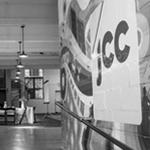

At JCC Harlem, a Diverse Community Takes Shape
It seems nearly impossible that it’s been only two years since JCC Harlem opened its doors. What’s even harder to believe is how much it has accomplished—and what it has added to the community landscape—in such a short time.
A huge part of JCC Harlem’s work, says Dava Schub, chief program officer at the Marlene Meyerson JCC Manhattan, has been figuring out “how we open our doors to the community as a whole.”
One way is by working closely with our Joseph Stern Center for Social Responsibility. Ruth Messinger, the JCC’s social justice advocate in residence, leads a discussion group focusing on social issues. Messinger has also been instrumental in devising a year-round approach for honoring the work of Dr. Martin Luther King Jr. “We make sure that as we do service projects, we connect them with learning and advocacy,” explains Meg Sullivan, JCC Harlem’s director. “Dr. King’s legacy shouldn’t be distilled to just one weekend a year.”
Social action, service learning, and advocacy are key to what JCC Harlem brings to the community, and all that is done through a partnership with Repair the World: Harlem. The two organizations work together to support Harlem partners through volunteer recruitment, joint Shabbat dinners, and conversations on racial, restorative, food, and environmental justice. In what seems a natural extension, JCC Harlem became a polling place in 2018 in time for the fall primary and midterm elections.
A partnership with Art in FLUX, an initiative that creates opportunities for artists by reclaiming underutilized and unique spaces for art, has brought three installations to JCC Harlem, and community members in to enjoy them as well. The installations have included artist talkbacks, spoken word events, and a project highlighting the role of caregivers in children’s lives. Through this partnership, Sullivan adds, “we get to live in the art all the time.”
A Range of Jewish Experiences
This fall, another project commissioned in cooperation with Art in Flux “created a unique and powerful space to celebrate Sukkot both with members of the Jewish—and broader community,” says Schub. That project, a sukkah created by Haitian American artist Vladimir Cybil Charlier, was constructed for the community at 112th Street and Manhattan Avenue next to Morningside Park. The idea, says Charlier, was to “try to reinvent the traditional sukkah from the point of view of the Caribbean Jewish population, which is often overlooked.”
A more traditional sukkah, installed by Chabad of Harlem, was set up in JCC Harlem’s adjacent outdoor lot. “Sukkot was a special coming together of many of the things we care about—community partnerships, different ways to do Jewish, and collaborative spirit,” says Sullivan.
Following the tragedy at the Tree of Life Synagogue in Pittsburgh, JCC Harlem convened with Based in Harlem, Kehillat Harlem, Harlem Moishe House, Repair the World: Harlem, and the Barnard/Columbia Grad Network for a Solidarity Shabbat, drawing 100 people for a potluck meal and gathering.
Approximately a dozen Jewish communal partners ensure that Fridays nights and Saturdays are booming at JCC Harlem. “Pretty much every Friday night is spoken for here,” Sullivan says.
Joyfully Jewish, introduced in the fall, is a unique Shabbat experience open to all. Led by JCC Executive Director Rabbi Joy Levitt, the Friday-night program features three core tenets: storytelling, singing, and mindfulness.
Attendance has also exceeded expectations for High Holiday services, Purim celebrations, and last summer’s weekly Shabbat in the Lot potluck dinners.
“People are very excited about building a community that includes the Jewish parts of their lives, and intertwining that with activities for 2s and 3s, seeing films, and so on,” Sullivan adds. “They’re happy that all that can be found in one place.”
Diversity by Design
While JCC Harlem is proving to be a Jewish home for many, it also serves as a welcoming space of community for the diverse array of people who live in the neighborhood.
That’s by design, according to Schub. “We’ve experimented with new outlets for community building with partners across race and faith lines, and we’re energized by the power and promise of this community to purposefully live in relationship to one another,” she says.
Diversity applies not just to the people who fill the space, but also the space itself. “The beauty of this place is that while there are consistent, ongoing programs, no day looks like any other,” explains Patria Diaz Perez, JCC Harlem’s program director. “That’s not to say it’s random—it just doesn’t look like it did yesterday. Each time you come in there’s an essence to the place, a freshness, which means you can experience community with four people or with 74 people.”
Sherri Lerner is the former editorial director at the Marlene Meyerson JCC Manhattan. She has written and edited for numerous publications and is currently on the staff of the Wechsler Center.